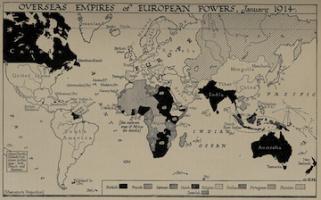UN Resolution Against Glorification of Nazism, US and Ukraine Vote No - Photo twitter @27khv
Only the United States and Ukraine voted against a UN Resolution denouncing the "glorification of Nazism." History proves that racism in all its forms is foundational to this country and continues to be affirmed.
Writing these words during the Thanksgiving “celebration” is sadly ironic as it illustrates the contradictions of a culture that has yet to reconcile itself with its colonial and white supremacist ideologies, past and present. Despite many criticisms, white supremacy remains not only well and strong, but is also recognized and hailed by the United States on the world stage as an acceptable and legitimate ideology.
Recently, Ben Norton, journalist at the Grayzone, reported, as others have occasionally done since 2004, on the refusal of the United States to vote to approve a UN resolution against the glorification of Nazism, racism and xenophobia. Indeed, in December 2020 and again in November of this year, the UN General Assembly voted on the Resolution “combating glorification of Nazism, neo-Nazism and other practices that contribute to fueling contemporary forms of racism, racial discrimination, xenophobia and related intolerance.” In 2020, 130 countries voted in favor of the resolution, 51 countries abstained and 2 countries voted against the resolution. The latter two were Ukraine and the United States. Moreover, as B. Norton explains, since its introduction, the American vote against the resolution has been backed by every administration, both Democrat and Republican.
While this may not come as a surprise to many, we must analyze the reasons for which the United States voted against this resolution and the implications of such a vote. In the past, other countries, such as Canada (abstained in 2020) voted alongside the United States against the resolution. Of course, abstention by many countries does not make these countries’ stances any less questionable.
On November 18, 2020, the U.S. Mission to the United Nations did provide an explanation for its voting against the resolution since 2005. In reviewing the explanations provided for the votes in 2019, 2020 and 2021, it appears that nothing has changed in many ways.
Although the United States claims to condemn “the glorification of Nazism and all forms of racism, xenophobia, discrimination and intolerance,” it has repeatedly refused to vote for the resolution. It does so because, according to the U.S. Mission to the UN, this resolution would legitimize the Russian “disinformation campaign” and supposedly justify using the fight against Nazi glorification and turn it against Russia’s neighboring countries. For the United States, the struggle against fascism could be used by Russia against certain entities, national or otherwise, and consequently, for the U.S. Mission to discourage other nations “from invoking Article 4 of the Convention on the Elimination of All Forms of Racial Discrimination and Article 20 of the International Covenant on Civil and Political Rights in order to either silence unwelcome opinions or to excuse their failure to combat intolerance.”
This is a very interesting, albeit seriously hypocritical, claim from a country that has repeatedly used and continues to use the alibis of spreading Democratic values such as Freedom and Human Rights of all to justify interfering in other countries (e.g., through the activities of the National Endowment for Democracy and USAID), and to actively and passively obscure the imposition of U.S. interests first and foremost. If the U.S. will intervene in foreign countries to promote its interests in the guise of spreading democracy, then simply going against white supremacy and fascism is a no-no.
Leaving the Russophobic narrative, it is rather interesting to read the second reason that leads the United States to refuse to officially combat Nazi glorification and white supremacy. The U.S. Mission to the UN’s explanation (2021) states:
“The United States Supreme Court has consistently affirmed the constitutional right to freedom of speech and the rights of peaceful assembly and association, including by avowed Nazis, whose hatred and xenophobia are vile and widely scorned by the American people. We nevertheless firmly defend the constitutional rights of those who exercise their fundamental freedoms to combat intolerance and express strong opposition to the odious Nazi creed and others that espouse similar hatreds.”
This argument is at once a bad faith argument and a frightening one.
First, the assumption that white supremacy and Nazism are “scorned” by the American people can certainly be questioned without much effort in light of U.S. history, support for U.S. international policies and right-wing populist movements in recent years. Even during the Second World War, namely, during the world’s struggle against fascism, the U.S. government’s policies against individuals of Japanese descent in the U.S. (the establishment of internment camps) certainly differed from those concerning individuals of German and Italian descent. Even during such dire times, the country’s white supremacist ideology could not be contained.
Second, the U.S. Mission to the UN’s rationale against the resolution is disingenuous. It presents a false equivalency that wrongly places on equal footing—morally, legally and practically—the freedom of Nazis, fascists and white supremacists and the freedom of those who oppose them. Despite numerous evidence of white supremacist, fascist and Nazi crimes in history, including colonization, genocidal practices, violent repressions, inhumane biological experimentations, mass imprisonments, common use of torture, disappearances and summary executions, ethnic, religious discriminatory policies and much more, the United States effectively reduces the history of white supremacy’s crime to a set of ideas, admittedly very bad ideas, by some whose rights are nevertheless no more, no less important than those of people opposing such ideas. Thus, the United States remains steadfast in protecting the rights of those who think that all Jews, Blacks, Muslims or any other target of fascist ideas should be exterminated. Put another way, expressing and promoting racist ideas, advertising the inferiority, the laziness, the mental sickness of Black people, the viciousness and deviousness of Asians, the spiritual corruption of women, the contagious transmission of ills by immigrants, etc. become commensurate, equally valid and equally defensible as ideas that are their categorical, political and moral opposite, no matter how historically and scientifically rooted this opposition may be.
We must not consider ideas, dangerous or otherwise, as divorced from action. Does the former not give rise to the latter in most cases? According to the argument of the U.S. Mission, the problem with Adolf Hitler did not lie so much in his ideas, nor in his right to write Mein Kampf, but seemingly in the implementation of his ideas. However, it is difficult to comprehend how one might implement ideas without conceiving of these ideas in the first place. Following the American No on this resolution, must we then confer upon Mein Kampf (and its horrific consequences) the same degree of consideration as the Charter of the United Nations, which ironically came into being precisely to prevent any and all resurgence of Nazism? By righteously upholding the freedom to express Nazi ideas, the U.S. Mission devalues not only anti-fascist struggles (and all anti-white-supremacist struggles), but also contemptuously turns its back against the almost half-a-million American lives lost countering this so-called freedom to entertain, and not-so peaceably act upon, fascist ideology. The U.S. Mission’s explanation is anchored in bad faith that consigns immoral and odious ideologies to the realm of harmless abstraction, as if they would conveniently remain there.
The refusal of the United States to uphold this resolution, as 130 other countries did, speaks to the American commitment against officially impeding any rise and growth of white supremacist, Nazi, neo-Nazi, fascist, neofascist, racist and xenophobic ideologies. By pretending to hold a lofty, magnanimous position, i.e., one above and beyond the aforementioned isms and ideologies, the United States can now refuse to combat these ideologies in the name of freedom of thought and expression, with all ideas being equal. This is a not-so-subtle hypocrisy.
Accordingly, the U.S. can thereby facilitate fascism and white supremacy without embracing these explicitly simply by reducing Nazism, white supremacy and fascism to a set of ideas among other ideas. As all ideas are valid (e.g., fascist and anti-fascist ones), these ideas can remain free to grow and develop without interference. Yet, by the same token and paradoxically, the U.S. will force and push the mythology of democratic freedoms actively and even militarily to further its interests, demonstrating that ideas are not simply ideas floating about among ideas but active initiation of policies.
The notion that all ideas are equal under the sun is a complete delusion and a mostly rhetorical exercise when it is not outright legal trickery. History has demonstrated again and again, in Jim Crow America, in Auschwitz and Buchenwald, colonial Africa and Asia, in Imperial Japanese biological research centers, that the ideas purported by racial supremacy, Nazism, Neo-Nazism, fascism, neo-fascism and all racist ideologies are not just ideas that are equivalent to every other idea opposing them. Fascist ideas are not just ideas that have been part of canons of human cultures across the planet. Nor can they be simply the subject of rational debate: Are you for or against fascism? These ideas incarnate hatred and death, which with its vote, the United States hopes to justify, and worse, exculpate.
In their pseudo-objective frame claiming that all ideas are equally free to be expressed and practiced, the U.S. Mission to the UN implies that the ideas that led to the emancipation of Black slaves are morally and practicably equivalent to the ideas claiming that Blacks are inferior human beings. This is not simply false; this is barbarism cloaked in righteous pseudo-humanism. The explanatory claim by the United States Mission to the UN, with its pathetic ahistorical argument, is politically fraudulent and shameful beyond words.
The tacit exceptionalism supposedly upholding the absolute freedom of all ideas independently of history confirms that the U.S.’ argument is only a veil that supports white supremacist and fascist ideologies. In other words, white supremacist, fascist and right-wing ideologies are inherently bound to capitalism and its oligarchies.
The United States does not vote for combating the glorification of Nazism, of all forms of discrimination because fundamentally and to this day, these ideologies represent in various forms the very foundation of capitalist, imperialist America. The United States confirms that it is white supremacist. From thought to act, with the exception of its alliance with the Soviet Union during World War II, from Europe to South America through Africa and South East Asia, the United States has repeatedly, explicitly and for all to know, associated itself, financed and supported all fascist regimes of various brands. And the United States’ vote against this resolution certainly caters to its fascist allies or nations that did collaborate with Nazis and fascists, protecting them from both present dangers as well as the threat of historical memory.
Any attempts by the United States to pretend to distance itself from its fascist allies and to espouse antifascist tendencies is clearly contradicted when it will shamelessly and arrogantly, on the stage of the United Nations for the whole world to witness, refuse to officially combat any “glorification of Nazism, neo-Nazism and other practices that contribute to fueling contemporary forms of racism, racial discrimination, xenophobia and related intolerance.”
In this country, let us spell it clearly, embracing Nazism, neo-Nazism, all practices that contribute to fueling contemporary forms of racism, of racial discrimination and of xenophobia are deemed by the United States as a Right. The white supremacy of the 19th and early 20th Century need no longer be hidden, it is now protected as a Right. From the United States’ institutional perspective, to embrace the ideology that gave rise to the genocides of colonialism, to the Holocaust and more, is today, perversion of perversions, a Human Right.
We must state the obvious: Nazism and all forms of supremacist incarnations directly oppose, and are contradictory to human rights. The contradiction in the U.S. Mission’s response is this: One cannot both fight against the “murderous tyranny of Nazism” and then turn around and espouse tolerance for it. These two “ideas” are mutually exclusive. One cannot be a fascist and an anti-fascist. One cannot be racist and anti-racist simultaneously. Supporting or choosing one side (e.g., violent extremism) precludes membership in its opposite. In the end, the United States, once more, true to its roots and true to its ideology, stands as the protector of all neo-Nazis, neo-fascists, white supremacists, racists and xenophobes.
Since the end of World War II, the United States has played the white supremacist card again and again, not only to divide the People of the United States, but also those of other nations by either upholding white supremacist positions domestically and pretending to take on anti-fascist positions internationally, where it interferes in the name of all minority, women’s, LGBTQ rights and so on. Old and new Nazism, old and new fascism, white supremacy in all its brandings, remain an integral part, both constitutive and strategic, of US policies and politics.
However, let us not point the finger only at the United States. Its 51 ideological, economic, financial and cultural colonies, i.e., the 51 nations that abstained, seemingly unsure whether “combating glorification of Nazism, neo-Nazism and other practices that contribute to fueling contemporary forms of racism, racial discrimination, xenophobia and related intolerance” is a good thing or not—amazingly Germany, Italy and Japan among them — should not hide behind a fake indecisiveness, a stance made only possible by their master’s shameless position. In these cases, regardless of motivation, abstention only means these countries’ tacit approval of the negative vote of the U.S. and Ukraine, and accordingly, should in no way be mistakenly hailed as courage and integrity. The refusal by the United States to vote in favor of this resolution, despite the weight of history, is so fundamentally congruent with white supremacist and Nazi ideologies that even the representative of the U.S.-backed reactionary State of Israel, a state certainly not known for its human rights record, voted in favor of the resolution.
Such a harmful and dangerous contradiction cannot be validated and legitimized. This is what this consistently shameful vote by the United States reveals once and for all. Let us no longer pretend that we do not know.
Philippe Gendrault, Ph.D. and Wendy C. Ong, Ph.D. are both mental health providers committed to the anti-racist, anti-imperialist struggle for social and political justice.



















